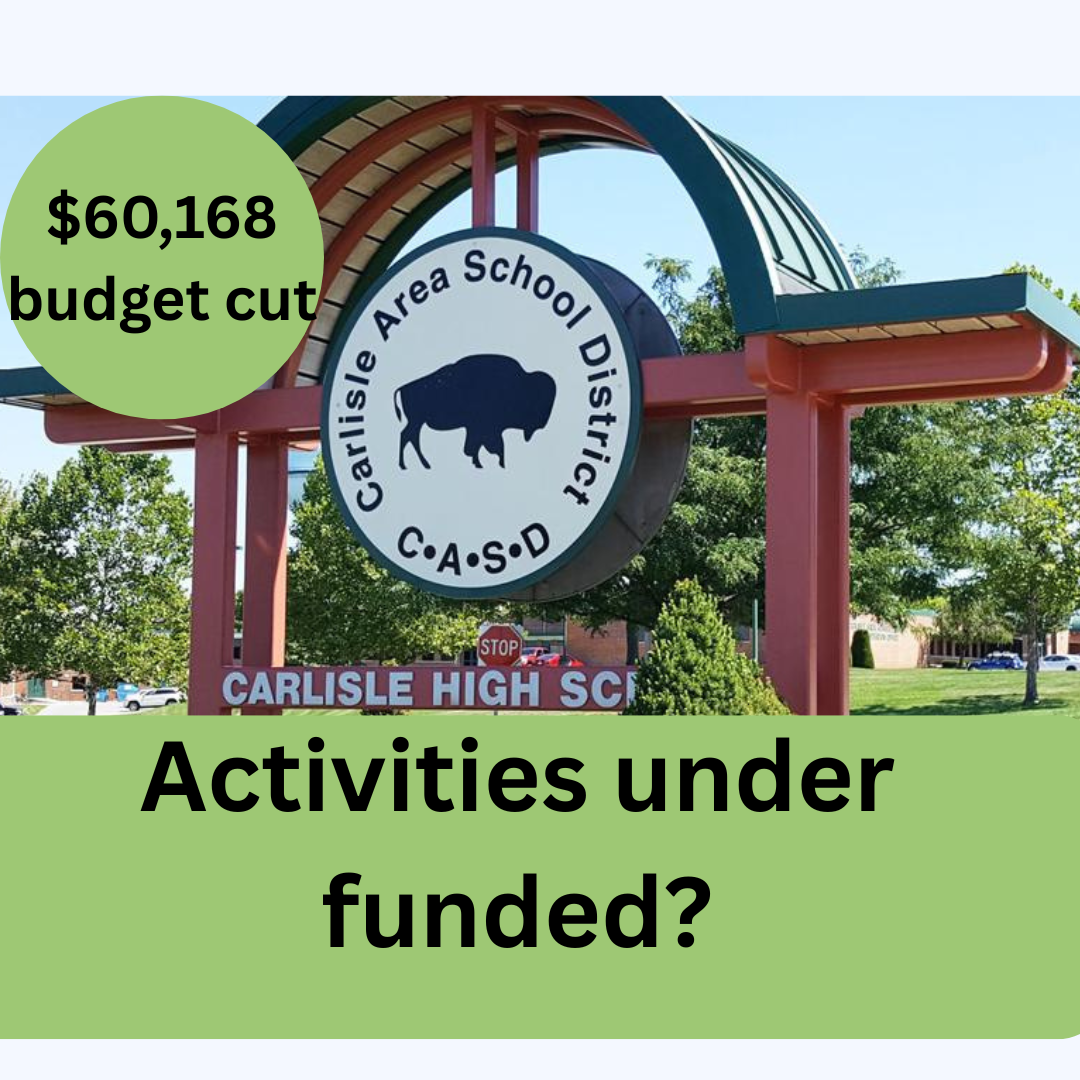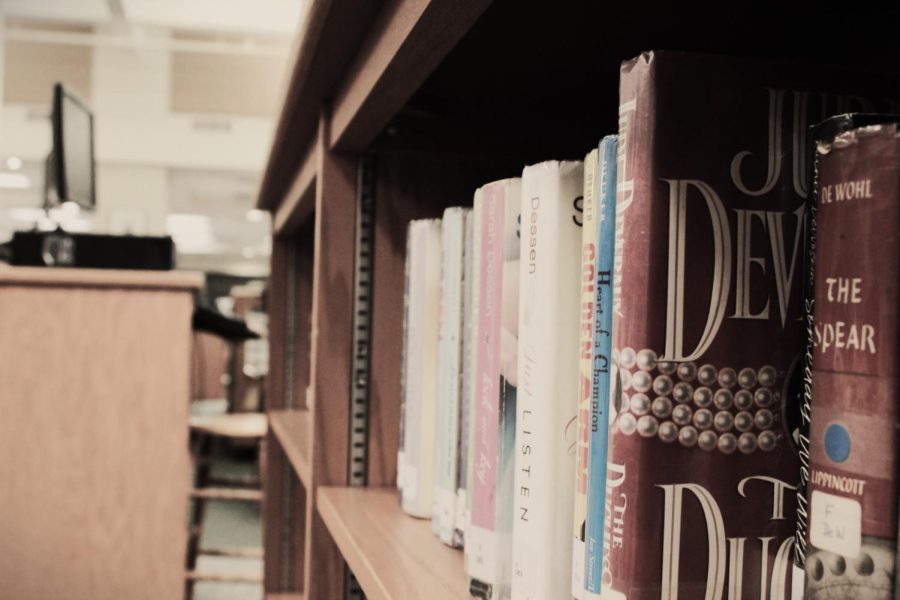Book Bans: Access to books should be guaranteed (Editorial)
Books presented on a bookshelf at the Carlisle High School library.
As children, we learned to embrace our uniqueness with Camilla Cream and to imagine with Harold and his purple crayon. The tons of unforgettable memories of reading childhood books have a huge influence on the development of a child from a young age. Most of those unforgettable memories that spark curiosity and creativity begin in a library.
Libraries are invaluable because they allow access to books to everyone who wants to read, regardless of their background. They also offer a diverse array of books to fit all readers.
Students tend to notice the accessibility of books around them and are aware when a book they love suddenly goes missing because of ‘inappropriate content.’ Although it may seem like an honorable reason to ban books, the reasons books are deemed inappropriate comes from a place of fear of the future. Many high schoolers across the United States are being affected by these book bans, which are unjust. Students should be guaranteed the freedom to read whatever they want, and they should be able to find those books in their school library.
Book bans have been on the rise recently, and it has become excessive. PEN America’s Index of School Book Bans has reported around 2,500 instances of individual books being banned which has affected about 1,650 book titles. The titles being most frequently banned include content about racism, sexual and gender identity, as well as books with LGBTQ themes and characters.
Many states have book bans, the states with the most being, Texas, Florida, and Pennsylvania. There are several school districts in Pennsylvania with book bans, but Central York School District and Elizabethtown Area School District have the worst case out of them all. They have several books that are banned and even more that are soon to be banned, the list is ongoing and is growing by the day. Out of the 446 bans reported since August 2022, Central York School District is responsible for 441 bans.
Books of many different topics are being banned and many well-known titles are not allowed to be present in many school libraries. For example, The Hate You Give by Angie Thomas, Gender Queer by Maia Kobabe, and Lawn Boy by Jonathan Evison. These books are some of the most common to be banned or challenged in schools.
When stakeholders express their concerns, schools will consider a book ban. Every district has their own procedure for reviewing bans, but almost none of them involve considering the opinions of students. Book bans have occurred in 138 school districts within 32 states. Those districts represent 5,049 schools with a combined enrollment of nearly four million students. These students have been stripped of the right to read the books they love and adore. Those four million students do not get to enjoy the same experiences that the students without book bans have.
Books have a significant influence on the way a child learns to express themselves through issues they may be dealing with. They provide a way for students to be represented by people who are similar to them. When these books are banned, teens are forced to read about the stereotypical life of a child their age. These bans cause more harm than good to a teen, the lack of representation in the books only showcases stereotypes that can affect the way these young adults think about themselves.
The books being banned are not titles that have concerned the kids reading them. The parents are concerned because their children are asking questions about the topics they were shielded from at a young age. The politicians and community members are scared to introduce the realities of the world to the children and teens of their community. These books are eye-opening for many kids because they have never been introduced to these subjects before. PEN America has identified at least 50 groups advocating for book bans, mostly including parents, community members, and politicians.
Allowing teens to read books based on the realities of the world will also prepare them for their upcoming future. These books provide an experience that teens may not come across daily and give insight on how a teen could react during an unexpected situation. By intentionally reading diverse books, readers become more empathetic and are more likely to relate to everyone and anyone they meet. Shielding students from the truth does not make it disappear and banning these books does not keep these topics away, these young adults will find a way to uncover these truths.
School districts should care about their students and districts should make choices to benefit the learning of their current students. Students should get to choose a book they enjoy without any obstacles in their way. They should have the opportunity to learn about certain issues and broaden their perspectives on many prevalent topics. School districts should be able to honor their students’ perspectives. Students should have the choice to choose any book without difficulty, whether it’s for a school project or just for fun.
Although banning books is morally wrong, it is also against our constitutional rights. The First Amendment protects freedom of speech. These books cannot be outright banned, unless they are challenged in court. In the case, Tinker v. Des Moines, the U.S Supreme Court ruled that students have the same rights as anyone else. A book should only be banned if the court says it must be, school officials should not ban books unless it is necessary, meaning the book causes harm or glorifies very inappropriate actions.
When the politicians and community members decide to put aside their own beliefs and opinions for the better of the future children, that is when society will flourish. Teens are the future of the world, and when they read about the current issues, they will adapt to them and make the world a better place. Books allow for personal growth, and overall allows society to thrive as a whole.
Disclaimer: Articles designated as “Editorial” represent the views and opinions of the author, not the 2021-2022 Periscope staff, CHS/CASD administration, or the CHS student body.
Want to help the Herd? Please consider supporting the Periscope program. Your donation will support the student journalists of CHS and allow us to purchase equipment, send students to workshops/camps, and cover our annual website hosting costs.

Haylie Potter is a Sophomore that is returning to the Periscope staff. Haylie participates in CHS cheerleading and is on the Varsity and Competition team....





























































































